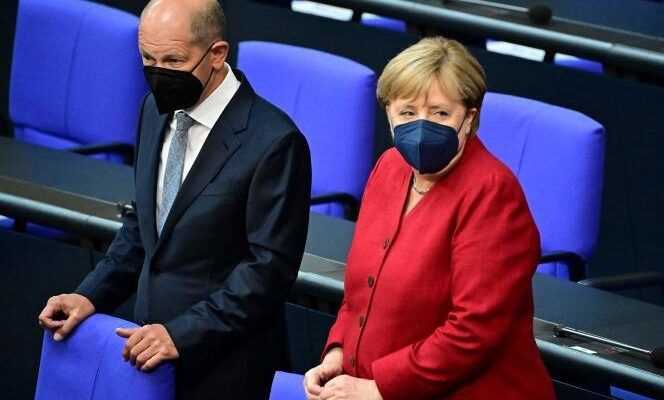He has not yet taken office, yet Olaf Scholz, the future German Chancellor, is already on the move to stem the surge in SARS-CoV-2 infections in the country, where a first suspected case of the new Omicron variant was detected in Hesse.
The one who is to take power in December at the head of an unprecedented tripartite coalition discussed Tuesday, November 30, during a meeting with Mr.me Merkel and the leaders of the sixteen German regions of a possible tightening of restrictions and compulsory vaccination against Covid-19.
The Bundestag – the German Parliament – will be called upon to vote by the end of the year on a law imposing it on the entire population. “I suggest that (…) the deputies make a proposal [de loi] in Parliament “ on compulsory vaccination, he said in an interview with Bild TV, specifying that this text should be presented ” This year “ for entry into force in February or March.
Für Olaf Scholz seien Ungeimpfte „der Grund für die aktuellen Probleme“. Er kündigt an, 2G und 2G-Plus auf ganz Deu… https://t.co/vpEl1F119d
The conservative CDU-CSU camp of outgoing Chancellor Angela Merkel, who is about to go into the opposition, now supports compulsory vaccination. According to the daily Die welt, a large majority of green deputies, who will govern with the Social Democrats, are also in favor. Tuesday’s meeting between the federal government, the next coalition and the regions may, however, not lead to any immediate new measures. Another meeting should be organized on Thursday.
A general at the head of a crisis team
Like Portugal and Italy, where two soldiers, Admiral Henrique Gouveia e Melo and General Francesco Figliuolo, led the vaccination campaign against Covid-19, Germany is turning to General Carsten Breuer of the Bundeswehr, responsible for the management of the vaccination campaign. However, many officials believe that the patchwork of rules is confusing and want to standardize restrictions nationally.
About 68% of the German population is fully vaccinated, a significantly lower coverage rate than other European countries such as France, Spain or Portugal. About 10% of the population received a booster dose.
The vaccination obligation was recently decided on for staff in nursing homes and hospitals, as well as soldiers of the Bundeswehr, and should come into force soon. Compulsory vaccination, long rejected by a majority of Germans, is now demanded by nearly two-thirds of them (64%), according to a poll published on November 18 by RTL-NTV. On Tuesday, a new RTL-NTV poll showed that 65% of the population is favorable to a new confinement.
In most of the country, the unvaccinated can no longer access, even with a negative test, shows, restaurants, gyms and even hairdressing salons. While many Christmas markets have closed in the most affected regions, large gatherings still take place in others. The outgoing government criticized, Monday, the influx of 50,000 supporters in Cologne – often without a mask and little concern for the respect of barrier gestures – for the Rhine derby against Mönchengladbach.
Karlsruhe Court validates measures taken
In the morning, the Court of Karlsruhe, the highest German court, whose decision was awaited before meeting, deemed justified and proportional the measures taken by the government since the start of the epidemic.
The Court considered that the restrictions on contact, exit and school closures “In the situation of extreme risk of the pandemic were compatible with the Basic Law”, in response to an appeal filed several months ago by opponents of partial confinement imposed by the authorities, during previous peaks of contamination cases.
Justice thus reinforces the calls to toughen and homogenize at the national level the measures to stem the fourth wave of Covid-19 in Germany. “Every day counts”, had launched, Thursday, Angela Merkel.
“What must happen is absolutely clear: contacts must be reduced”, estimated, Tuesday morning, the next vice-chancellor, the ecologist Robert Habeck. “The rule” vaccinated cured “must be implemented in a binding manner at the national level for all public institutions”, with the exception of necessities shops, said the co-chairman of the Green party, interviewed by the public channel ZDF. “It is called – it must be said loudly – confinement for the unvaccinated”, he added.
Slight decrease in incidence rate
The seven-day Covid-19 incidence rate fell very slightly for the first time in three weeks in Germany, data show Tuesday by Robert-Koch Institute (IRB). It now stands at 452.2 people infected out of 100,000 during the past week, against 452.4 Monday, which is the first reflux since the beginning of November in Germany.
With 45,753 new cases identified on Tuesday, the daily toll of contamination remains, however, 427 higher than it was a week earlier, but the weekly rate of progression has slowed in recent days.
